World
Out in the World: LGBTQ news from Europe and Asia
Russian Supreme Court declared global LGBTQ rights movement ‘extremist’

NEPAL
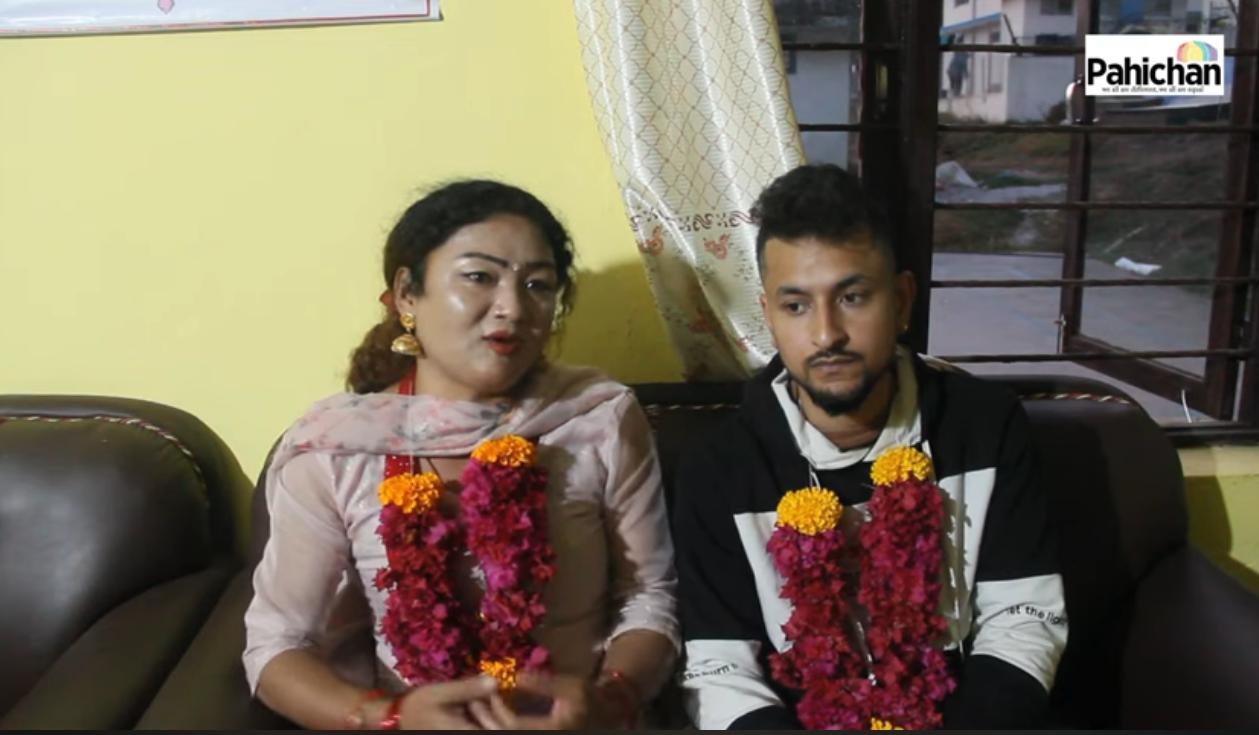
The marriage between Maya Ram Bahadur Gurung and Surendra Pandey this past week in the Nepalese capital city of Kathmandu is being hailed by the country’s LGBTQ rights activists. Gurung, a transgender woman and Pandey, who is gay, was registered by the local municipality ward office four months after the Himalayan nation’s highest court legalized same-sex marriages in an interim order.
Sunil Babu Pant, the former executive director/CEO and founder of the Blue Diamond Society, first LGBTQ rights organization in Nepal, who has also served in the country’s parliament was present for the civil ceremony telling the Associated Press: “After 23 years of struggle, we got this historic achievement, and finally, Maya and Surendra got their marriage registered at the local administration office.”
In a later interview with Naya Prakashan news Pant noted. “A wedding in Nepal today can become the signpost in South Asia for a more equal tomorrow.”
Human Rights Watch reported that Gurung, a trans woman who is legally recognized as male, and Pandey, a cisgender gay man, held a Hindu wedding ceremony in 2017. They first attempted to legally register their marriage in June this year at the Kathmandu District Court, following an interim order by Nepal’s Supreme Court instructing authorities to register same-sex marriages while considering a case that argues for marriage equality across the country.
When that court rejected their registration, saying it did not need to recognize a couple that was not one legal male and one legal female, they appealed to the Patan High Court in September.
But the high court judges rejected the appeal, saying that it was the responsibility of the federal government to change the law before the lower authorities could register such marriages, HRW reported.
Nepal’s civil code currently only recognizes marriages between one man and one woman. The Supreme Court attempted to rectify that by ordering the creation of an interim registry for nontraditional marriages until parliament changes the law. The two lower courts then reversed the logic by claiming that the national law must be changed first.
MALAYSIA
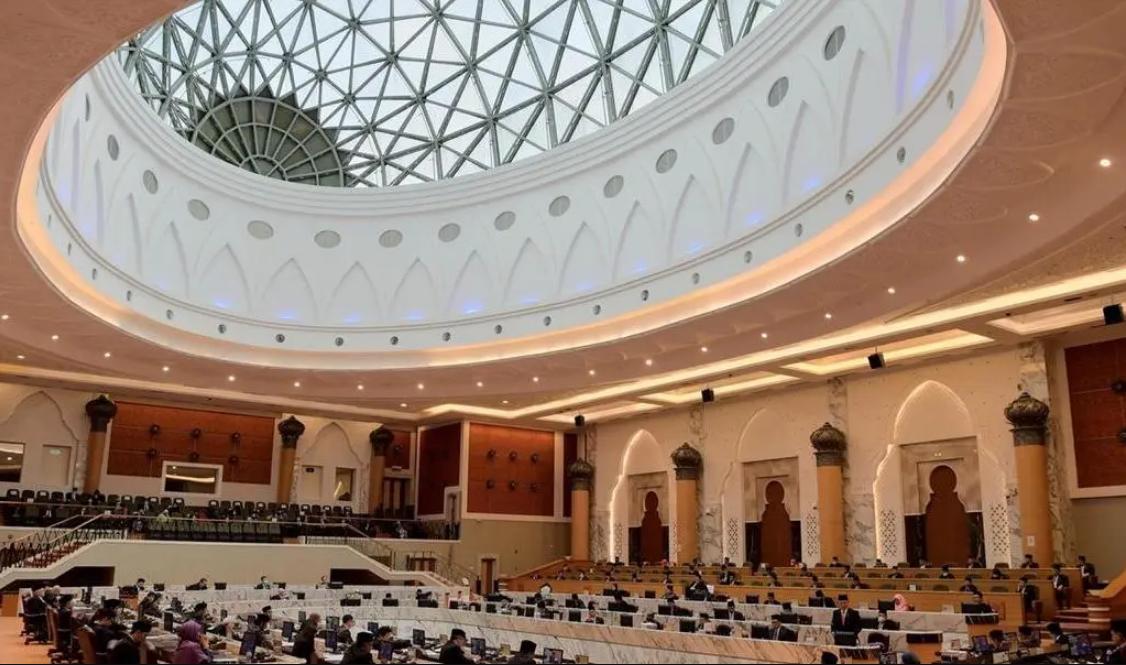
Malaysian LGBTQ rights activists are decrying efforts by the Johor state government to establish a “rehab” center for “people in same-sex relations,” which would use the globally debunked conversion therapy to change sexual orientation.
Malaysian society is predominately Muslim and conservative. Human Rights Watch has noted that the government authorities in the Malay Archipelago are willing to enforce the rigid gender roles by which they compel all Malaysians to abide with few exceptions.
Speaking at the Johor state assembly on Wednesday, the state’s Islamic Religious Affairs Committee Chair Mohd Fared Mohd Khalid said 400,000 ringgit ($86,000) has been allocated for the rehabilitation center, which was expected to open in July next year the South China Morning Post reported.
“This rehabilitation center is established … for them to get back on the right path,” Fared told the assembly.
Aside from same-sex individuals, Fared proclaimed that the centre would also house “those who are deemed deviant” from the state-prescribed religious Islamic orthodoxy, which includes the Ahmadiyya Muslim Community and Baha’i among some 42 groups, the state’s religious affairs body has identified as “deviant.”
The Malaysian government relies on the force of law to prohibit expression and conduct that fall outside of a heterosexual, cisgender norm. It is one of only a handful of countries that explicitly makes gender nonconformity a criminal offense.
Reacting to the rehab news, Justice for Sisters, a trans rights group, told the South China Morning Post that detaining people was a violation of the Malaysian Constitution, which safeguards personal liberty, privacy, dignity, equality and prohibits discrimination on the basis of gender.
“Detaining people on the grounds of changing their SOGIE — sexual orientation, gender identity and gender expression — amounts to torture without a doubt,” said the group’s spokesperson, Thilaga Sulathireh.
Malaysia also criminalizes consensual same-sex conduct at both the federal and state levels. Its officials frequently insist that the laws criminalizing lesbian, gay, bisexual and trans people are intended not primarily to punish, but rather to return them to “the right path,” statements echoed this past week by Johor’s Islamic Religious Affairs Committee chairman.
Human Rights Watch notes that officials under successive Malaysian governments have typically coded their approach to sexual and gender diversity in a logic of “prevention” and “rehabilitation,” backed by the threat of punishment. Former Prime Minister Muhyiddin Yassin, who was in office between March 2020 and August 2021, described LGBTQ people as a threat to Islam, backed by “foreign influences” and a “disorder” that requires counseling.
THE VATICAN

Pope Francis this past week further disciplined another American prelate, retired Cardinal Raymond Burke, who has publicly critiqued Francis over the pope’s ongoing efforts for reforming the Catholic Church, especially over issues centered on LGBTQ Catholics and the LGBTQ community.
The Associated Press reported that Francis revoked Burke’s subsidized Vatican apartment and retirement salary, according to sources because he was a source of “disunity” in the church.
The move is “unprecedented in the Francis era,” Christopher White, a Vatican observer who writes for the National Catholic Reporter, told the BBC.
“Typically, retired cardinals continue to reside in Rome after stepping down from their positions, often remaining active in papal liturgies and ceremonial duties,” he said. “Evicting someone from their Vatican apartment sets a new precedent.”
Burke, who spends much of his time in the U.S. at the Our Lady of Guadalupe shrine he founded in his native Wisconsin, has not yet been notified of the pope’s actions according to the AP.
At the end of October, the pope convened a month long conference, known as a Synod of Bishops, followed an unprecedented two-year canvassing of rank-and-file Catholics. During the conference Jesuit Fr. James Martin, a popular spiritual author and editor of the LGBTQ Catholic publication Outreach, noted that on LGBTQ issues, “There were widely diverging views on the topic,” he said.
In early November, Bishop Joseph Strickland of Eastern Texas was “relieved” of his position as head of the Diocese of Tyler by Francis after Strickland’s refusal to resign in a dispute over the church’s LGBTQ inclusion in Catholic practices. Strickland often had echoed Burke’s positions.
Although retired in 2014, Burke had an incredibly anti-LGBTQ public record since, especially in vocalizing his opposition to plans to be inclusive of the LGBTQ community. Burke was once a high-ranking U.S. archbishop and head of the Apostolic Signatura, the Vatican court, but was repeatedly demoted under Francis and then forced to retire.
In March 2020, Burke laid blame on the coronavirus pandemic on the LGBTQ community. As churches were forced to close during the lock-downs ordered by health officials, Burke wrote:
“Worship is particularly needed now because of ‘how distant our popular culture is from God,’ he wrote, noting abortion and euthanasia, then attacking the LGBTQ equality movement, particularly activism for recognition of trans identity.
“‘We need only to think of the pervasive attack upon the integrity of human sexuality, of our identity as man or woman, with the pretense of defining for ourselves, often employing violent means, a sexual identity other than that given to us by God,” he said. “With ever greater concern, we witness the devastating effect on individuals and families of the so-called ‘gender theory.'” Burke went on to say, “There is no question that great evils like pestilence are an effect of original sin and of our actual sins.’”
Burke once compared lesbian, gay, and bisexual people to murderers.
UNITED KINGDOM
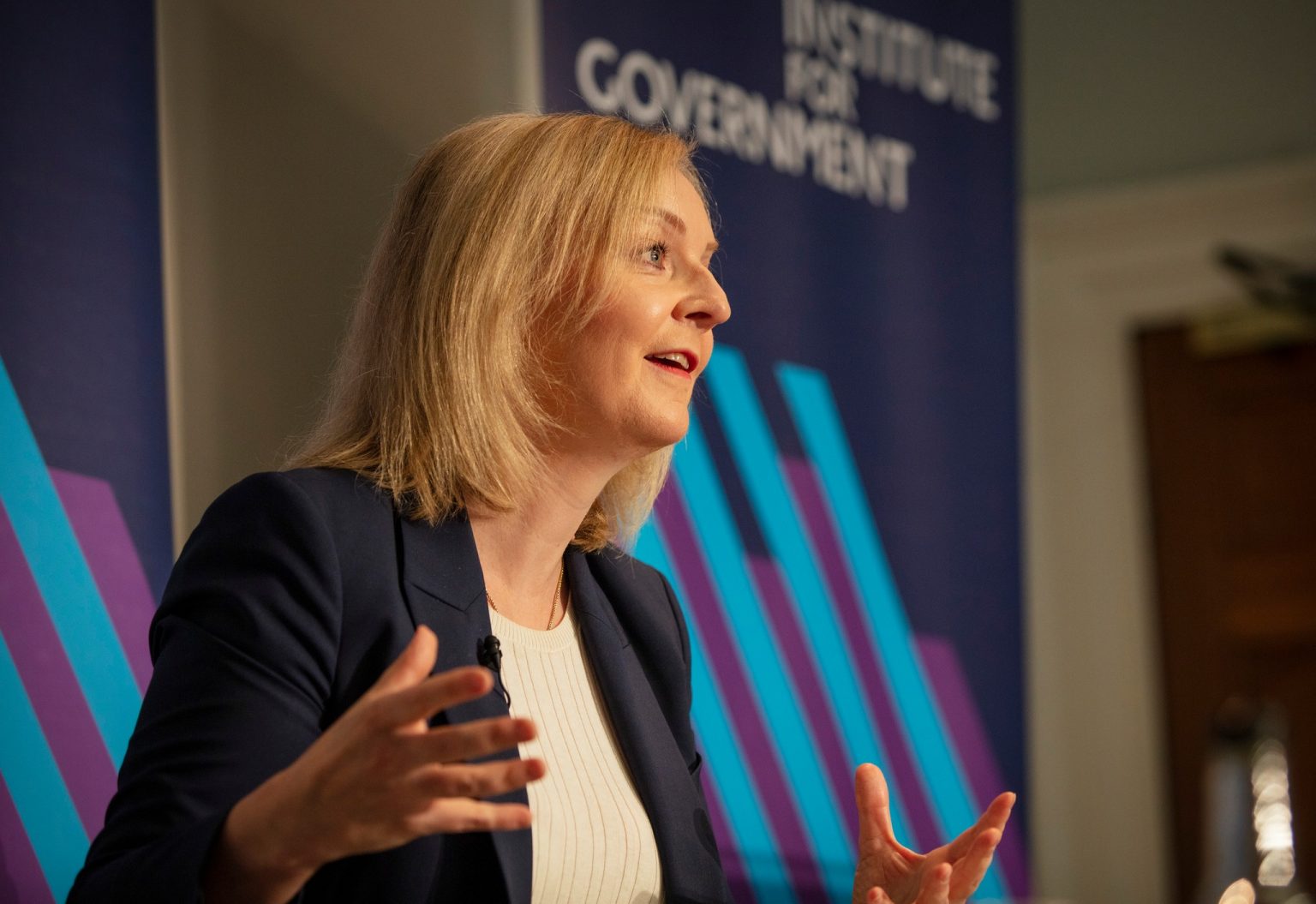
Former British Prime Minister Liz Truss is said to be backing a private bill to be introduced into the House of Commons that will ban minor children under the age of 18 from accessing hormone therapy and block the National Health Service and the UK government from recognizing their social transition.
After Truss was one of 20 backbencher MPs to be selected to bring forward a bill, a source reportedly said she chose the legislation because she believes under-18s need to be protected from “making irreversible decisions about their bodies.”
PinkNewsUK pointed out that argument fails to consider the fact that trans under-18s are typically prescribed physically reversible puberty blockers and are only permitted to do so after lengthy medical checks.
Physically reversible puberty blockers are also typically only given to teenagers over the age of 16. It is exceptionally rare for under-16s to be prescribed puberty blockers.
Despite this, Truss is expected to formally present the bill on Wednesday during a House of Commons hearing where its MP backers will also attend, PinkNewsUK also reported.
A spokesperson for the UK government said in a statement: “This government is clear on the fundamental importance of biological sex.”

A magistrate’s court found a 51-year-old man guilty of a hate crime in an assault on Drag Race UK star The Vivienne this past June at a local McDonald’s. Alan Whitfield told the court that he had struck James Lee Williams, aka The Vivienne, in the face claiming that his actions were not motivated by homophobia but by what he described as “banter.”
During his testimony, 31-year-old Williams said he was subjected to a “barrage of abuse” from Whitfield after entering the fast food restaurant PinkNewsUK reported.
“He [Whitfield] carried on, then after the fourth ‘look at the state of you’ I said ‘look at the state of you’, I said ‘look at the state of your face’, to which he said ‘I’ve got skin cancer’ and then punched me straight in the face.”
PinkNewsUK reported that the RuPaul’s Drag Race UK star, who took home the crown in the first series in 2018, argued that the attack was motivated by homophobia because there were “countless other people” in the McDonald’s at the time.
Whitfield maintained throughout the proceedings that the assault “was nothing to do with him [Williams] being gay,” reiterating that he has LGBTQ members of his family.
After court deliberation, Justice Anthony Canning said that Whitfield’s evidence was “not credible.”
“Having considered this incident from beginning to end, we believe beyond reasonable doubt that the hostility shown by yourself from that outset was motivated and down to the perceived sexuality of the complainant and this was homophobic in nature.”
Whitfield will be sentenced in January.
IRELAND
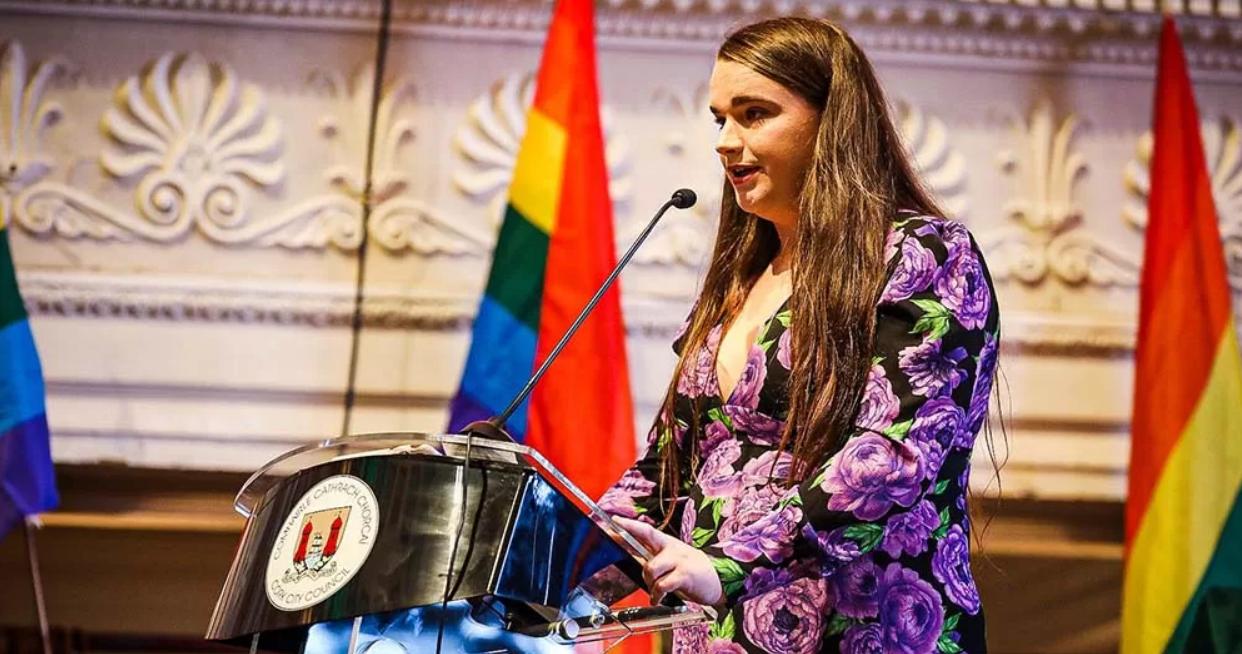
A 25-year-old second year law student at the University College Cork is set to make history the first openly trans person in history to run for local election in Ireland.
Saoirse Mackin, who co-founded Trans+ Pride Cork in 2022, was nominated by the Social Democrats to run in Cork City North West’s 2024 election. Mackin, who transitioned in 2017, told LGBTQ+ media outlet GCN – Ireland, that if elected, one of her top priorities will be eliminating the excessive healthcare barriers that are in place for trans women in Ireland.
Mackin also advocates for better cycling infrastructures, as well as affordable housing and improved public services GCN noted.
She said, “If elected, my priority areas will include the provision of more affordable housing, improved public services, universal access to healthcare and the development of quality cycle infrastructure in Cork. I will also campaign for better local amenities, such as upgraded parks, green spaces, playgrounds and sports facilities.”
In addition to being a trans activist, Mackin is also a law student and community organiser who has bravely spoken up against the growing far-right movement in Ireland. She was also named in the Irish Examiner’s 100 Women of 2022 list.
RUSSIA
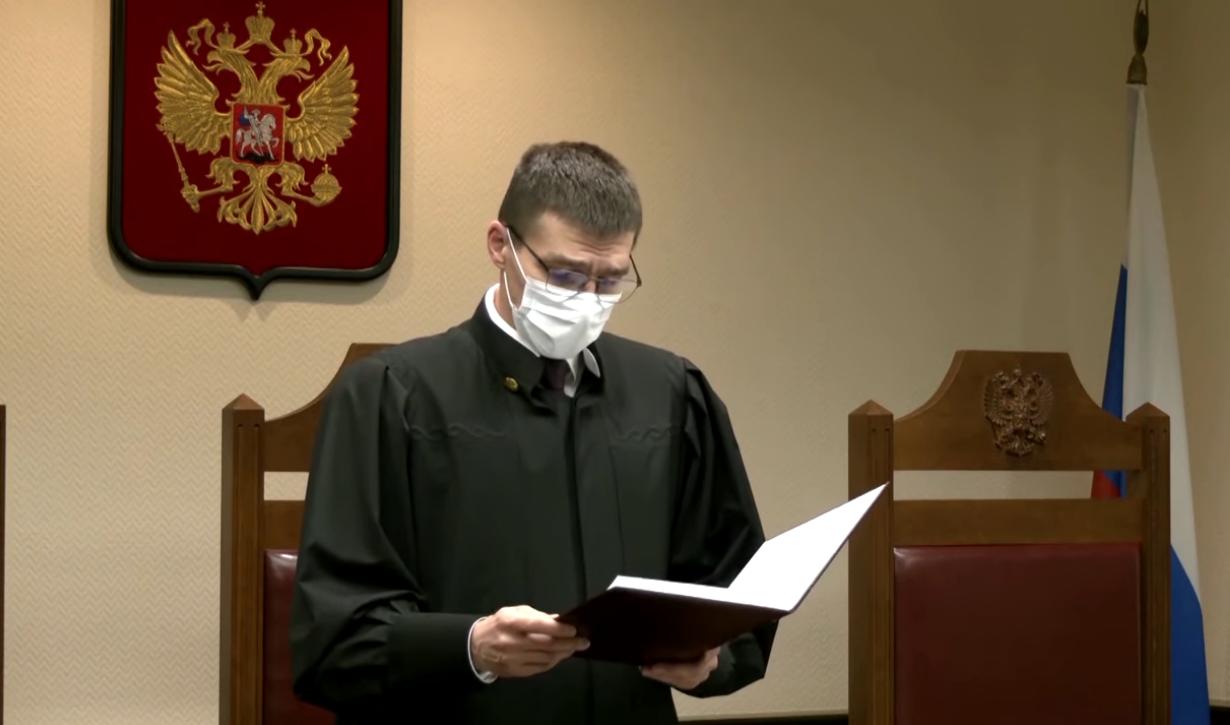
Russia’s Supreme Court this past week ruled that “the international LGBTQ movement” is “extremist” which, legal experts and human rights advocates say will lead to all LGBTQ groups and organizations in Russia being banned.
The Russian Justice Ministry had lodged an administrative legal claim with the High Court to recognize the International LGBTQ public movement as extremist and ban its activity in Russia. Justice Minister Konstantin Chuychenko did not specify whether it was seeking the closure of any specific groups or organizations, or if the designation would apply more broadly to the LGBTQ community, causes and individuals.
Speaking with Agence France-Presse, the head of the Sphere human rights group, which advocates for the Russian LGBTQ community, had criticized Chuychenko‘s actions.
“Russian authorities are once again forgetting that the LGBTQ+ community are human beings,” said Sphere head Dilya Gafurova, who has left Russia.
Authorities “don’t just want to erase us from the public field: They want to ban us as a social group,” Gafurova told AFP. “It’s a pretty typical move for repressive non-democratic regimes — the persecution of the most vulnerable. We will continue our fight,” he added.
UN High Commissioner for Human Rights Volker Türk in a statement issued from Geneva after the ruling said:
“This decision exposes human rights defenders and anyone standing up for the human rights of LGBT people to being labeled as ‘extremist’ — a term that has serious social and criminal ramifications in Russia,” said Türk. “No one should be jailed for doing human rights work or denied their human rights based on their sexual orientation or gender identity.”
“I call on the Russian authorities to repeal, immediately, laws that place improper restrictions on the work of human rights defenders or that discriminate against LGBT people. The law must uphold and defend the principles of equality and non-discrimination. The law must never be used to perpetuate inequality and discrimination,” Türk added.
Laws that must be reformed include those prohibiting gender-affirming medical and administrative procedures, and banning so-called “LGBT propaganda,” which made it illegal to discuss LGBT issues in Russia on penalty of substantial fines, Türk said.
The Türk also pointed out the wide use of the “extremist” label is more generally used to prosecute all those perceived as opponents, including politicians, journalists, human rights defenders and others.
“LGBTIQ people exist in every country, and a legal ban on the undefined ‘international LGBT movement’ will result in more violence, discrimination, and isolation of LGBTIQ people in Russia, who are already targeted for being who they are,” said Maria Sjödin, executive director of Outright International.
“Russia, which has already restricted access to information about LGBTIQ issues, is yet again violating the human rights of LGBTIQ people by restricting freedoms of association and expression. This is a great concern not just for human rights defenders focused on protecting the rights of LGBTIQ people but for everyone who believes in human rights for all,” Sjödin added.
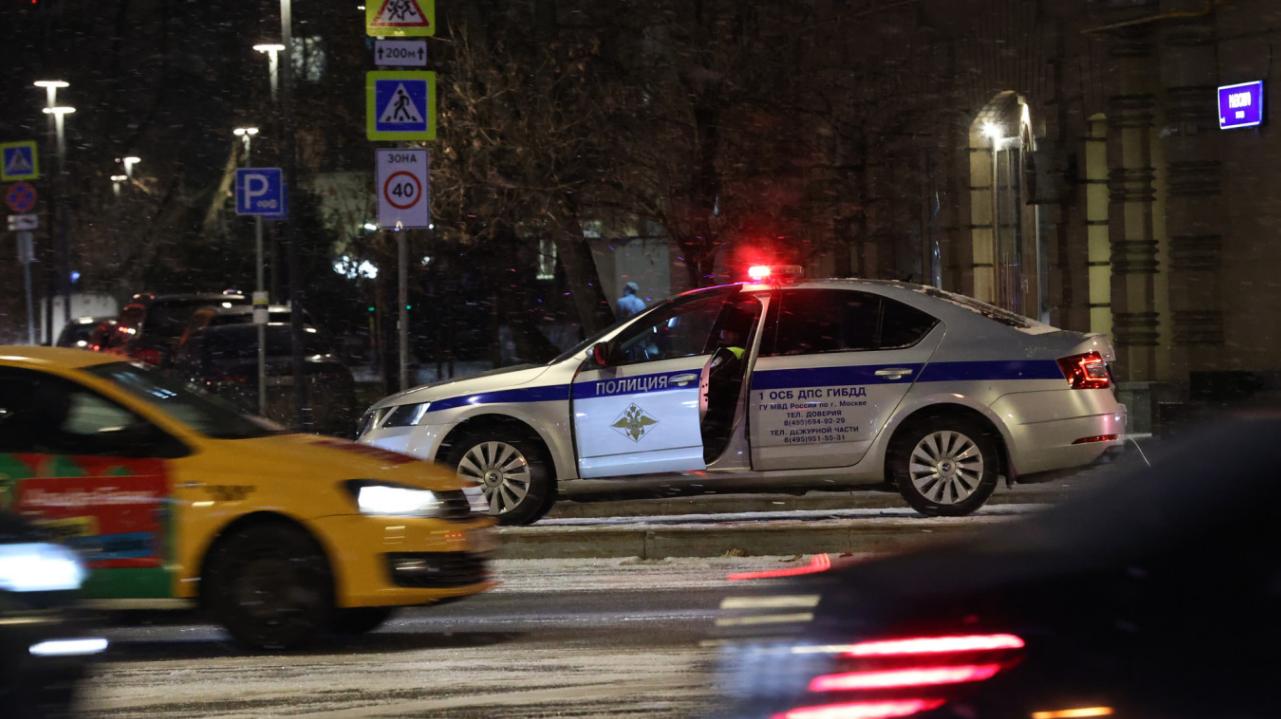
Within 48 hours of the High Court’s ruling, multiple Russian Law enforcement agencies executed a series of raids multiple queer venues in the Russian capital. At one club located on Ulitsa Malaya Yakimanka Street in the center of Moscow, there were approximately 300 people gathered when Russian security forces burst in under the pretext of searching for drugs in the establishment. Several persons were detained.
“In the middle of the party, they stopped the music and began to enter the halls [the police]. There were also citizens of other countries at the party. At the exit, they photographed passports without permission to do so,” an LGBTQ rights activist who had previously spoken to other media outlets told the Washington Blade in a phone call Sunday.
The raids took place in at least four venues, and were reportedly expected by the clubs management and owners.
Security forces arrived at an establishment near the Avtozavodskaya metro station and a themed strip club for men near the Polyanka metro station in central Moscow. The administration of the clubs warned visitors about the events in advance, the Moscow Times reported.
According to an eyewitness to the police raid on Mono, a bar also located in the city’s central district on Pokrovsky Boulevard, “there was the usual party, then the owner came out and said that within an hour law enforcement would arrive in connection with the recent ruling by the Supreme Court. Within 20 minutes the dance floor started to empty,” Ostorozhno Novosti, an independent Russian news outlet reported.
The Moscow Times could not independently verify Ostorozhno Novosti’s reporting, and employees from at least two of the clubs believed to have been targeted on Friday denied the reports, which they called “fakes.”
“I wake up … and I’m reading the news, and, of course, it’s hilarious. Where was [this raid] when we had nothing going on?” the manager of the club Mono said in a video posted on social media Saturday.
The Blade has also been unable to verify Ostorozhno Novosti’s reporting on the Mono bar raid but in a series of phone calls and Telegram chats was able to determine that multiple raids had in fact taken place across central Moscow and that gay clubs and LGBTQ safe spaces were targeted.
In the Baltic city of St. Petersburg, the largest gay club, Central Station, according to independent news outlet Sota, reported the club’s management said that they were denied further rental of the site due to the “new law.”
Additional reporting from Pahichan Media, the South China Morning Post, Human Rights Watch, The BBC, PinkNewsUK, Agence France-Presse, The Moscow Times, GCN Ireland, the Vatican News and the Associated Press.
India
Activists push for better counting of transgender Indians in 2026 Census
2011 count noted 488,000 trans people in country

India is preparing to conduct a nationwide Census in April, the first since 2011.
Interim projections based on the previous Census placed India ahead of China as the world’s most populous country. A Technical Group on Population Projections projection in July 2020, chaired by the Registrar General of India, estimated the country’s population in 2023 was 1.388 billion. Transgender Indians are now raising concerns about the data collectors and their sensitization.
Activists have raised concerns about whether data collectors are adequately sensitive to the community ahead of the Census. Government training material emphasizes household engagement, data privacy and sensitivity while asking personal questions, but publicly available flyers do not outline specific guidance or training related to recording trans identity during enumeration.
Concerns around the counting of trans people in India are not new.
The 2011 Census recorded around 488,000 trans people, a figure activists and researchers have described as a likely undercount due to stigma, misclassification, and a reluctance to self-identify. Subsequent surveys and field reports have pointed to inconsistencies in how gender identity is recorded and the absence of uniform sensitivity among Census data collectors. Rights groups and policy researchers have also warned that gaps in official data affect access to welfare schemes, legal recognition, and targeted public policy, making accurate counting central to future Census exercises.
A decade after the 2011 Census formally recorded trans people as a distinct category, multiple studies have continued to document entrenched socio-economic disparities. Research has pointed to lower literacy rates, limited workforce participation and barriers to healthcare access within the community.
A National Human Rights Commission-supported study cited in subsequent reporting found a significant proportion of trans respondents reported employment discrimination, underscoring the gap between formal recognition and lived economic inclusion.
Educational exclusion has remained a persistent concern within the trans community. Studies have documented higher dropout rates, lower literacy levels and barriers to continuing education, often linked to stigma, discrimination and limited institutional support. Policy researchers note that despite formal recognition in official data after 2011, targeted interventions addressing school retention and access for trans people have remained uneven.
Access to housing schemes has reflected similar gaps.
The Washington Blade in December reported only a small number of trans people have benefited from India’s flagship low-income housing program, despite its nationwide rollout and eligibility provisions. The findings underscored continuing barriers to inclusion in welfare delivery systems.
The Social Justice and Empowerment Ministry and the Office of the Registrar General and Census Commissioner did not respond to the Blade’s multiple requests for comment regarding sensitization measures for Census data collectors and the recording of trans identity in the upcoming Census.
Karnataka state in southern India last September conducted its first statewide baseline survey of gender minorities. The Department of Women and Child Development, in collaboration with the Karnataka State Women’s Development Corporation, launched the initiative to document the lives of trans people across 31 administrative districts.
When the results were released, the survey identified 10,365 trans people. The country’s 2011 Census, by comparison, recorded 20,266 trans people in Karnataka, nearly double the 2025 figure. The discrepancy raised questions about how the state’s recorded trans population appeared to decline over 14 years.
The discrepancy in Karnataka’s survey has intensified scrutiny over how gender minorities are counted. Reports questioned the methodology used in the 2025 exercise, which was conducted over 45 days beginning in mid-September. Instead of door-to-door enumeration, trans people were required to report to designated registration sites — primarily district-level public hospitals and sub-district government health facilities. The approach presented barriers for potential participants, particularly those in rural areas, those without reliable transportation, those wary of institutional settings due to prior discrimination, or those who did not know about the count, raising the possibility of exclusion.
Bihar state in eastern India in January 2023 conducted a caste-based survey that included trans respondents.
The final report identified 825 trans people in the state, compared with 40,827 recorded in the 2011 Census. Activists disputed the figure, calling it inaccurate and pointing to community estimates that suggested higher numbers, including in Patna, the state capital, raising concerns about significant undercounting.
The 2011 Census marked the first attempt to enumerate trans people at the national level, but researchers and activists have described the exercise as limited in scope.
It recorded 487,803 people under the “other” category, a classification used for respondents who did not identify as male or female. Analysts have argued that the figure likely underestimated the community’s size.
The Census questionnaire provided three sex categories — “male,” “female,” and “other” — a framework that critics said did not fully capture the diversity of gender identity and may have affected how some respondents chose to identify.
During the 2011 Census, enumeration practices varied across regions.
In states such as Tamil Nadu, local reporting indicated estimates were at times derived from existing administrative records, including state-issued trans identity cards, rather than solely through door-to-door identification. Such approaches risked excluding individuals who did not possess identity documentation or were not registered with welfare boards, raising concerns about gaps in coverage.
Official data from the Social Justice and Empowerment Ministry shows only a few hundred trans people as of early 2025 have been issued identity cards through the national portal, despite nearly 2,000 applications being submitted. Many are still pending or have been rejected.
Critics of the 2011 Census said many Census data collectors were not adequately trained or sensitized to engage with gender identity beyond traditional binary classifications. Similar, detailed guidelines specific to trans sensitization have not been publicly made available for the 2026 Census, according to an examination of training materials and official circulars.
Akkai Padmashali, a trans rights activist, told the Blade that Census data collectors in earlier exercises were often not sensitized and lacked awareness of intersex people and gender-diverse communities. She said trans people and other gender and sexual minorities continue to face social exclusion and require careful handling during door-to-door data collection. Padmashali called for targeted training of data counting officers and said the government should treat the issue as a priority, adding the trans population is likely to be higher than what was recorded in 2011 and efforts to make officials more sensitive to the community are necessary.
“We will definitely join our hands with this move the government of India has taken,” said Padmashali. “I think there should be proper guidance from the main in-charge people who are conducting this enumeration, and if no such proper information is given to these Census data collectors, it is difficult to gather any sort of information concerned.”
“This whole issue of self-identification — I think India, in its current situation, is not in such a way that it openly accepts people’s identities,” she added. “It will be challenging, it will be difficult, it will be a struggle to offer people the opportunity to express their identities as concerned. But to make sure those who are part of the sexual minority community are counted, I think we also take responsibility for educating people to be part of the enumeration.”
Padmashali said many people are not accustomed to using mobile devices and only a limited number are familiar with them. She said technology should not mislead or misguide the collection of information. Padmashali added she and other trans people plan to engage with Census data collectors and officials who organize the Census.
“Government should have local meetings,” said Padmashali. “Government should hold regional consultations on why the national enumeration is important, because we also know that from 2011 to 2026 is almost 15 years, and now we are here.”
“The government should hold local meetings, especially in their constituencies,” she added. “If the government meets with non-government organizations and civil society groups, this could become a more inclusive exercise across the country. India has a population of more than 1.4 billion, and I think this is the appropriate time to bring accurate statistics to help draft policies in the context of the larger community concerned.”
Books
New book profiles LGBTQ Ukrainians, documents war experiences
Tuesday marks four years since Russia attacked Ukraine

Journalist J. Lester Feder’s new book profiles LGBTQ Ukrainians and their experiences during Russia’s war against their country.
Feder for “The Queer Face of War: Portraits and Stories from Ukraine” interviewed and photographed LGBTQ Ukrainians in Kyiv, the country’s capital, and in other cities. They include Olena Hloba, the co-founder of Tergo, a support group for parents and friends of LGBTQ Ukrainians, who fled her home in the Kyiv suburb of Bucha shortly after Russia launched its war on Feb. 24, 2022.
Russian soldiers killed civilians as they withdrew from Bucha. Videos and photographs that emerged from the Kyiv suburb showed dead bodies with their hands tied behind their back and other signs of torture.

Olena Shevchenko, chair of Insight, a Ukrainian LGBTQ rights group, wrote the book’s forward.

The book also profiles Viktor Pylypenko, a gay man who the Ukrainian military assigned to the 72nd Mechanized Black Cossack Brigade after the war began. Feder writes Pylypenko’s unit “was deployed to some of the fiercest and most important battles of the war.”
“The brigade was pivotal to beating Russian forces back from Kyiv in their initial attempt to take the capital, helping them liberate territory near Kharkiv and defending the front lines in Donbas,” wrote Feder.
Pylypenko spent two years fighting “on Ukraine’s most dangerous battlefields, serving primarily as a medic.”
“At times he felt he was living in a horror movie, watching tank shells tear his fellow soldiers apart before his eyes,” wrote Feder. “He held many men as they took their final breaths. Of the roughly one hundred who entered the unit with him, only six remained when he was discharged in 2024. He didn’t leave by choice: he went home to take care of his father, who had suffered a stroke.”
Feder notes one of Pylypenko’s former commanders attacked him online when he came out. Pylypenko said another commander defended him.
Feder also profiled Diana and Oleksii Polukhin, two residents of Kherson, a port city in southern Ukraine that is near the mouth of the Dnieper River.
Ukrainian forces regained control of Kherson in November 2022, nine months after Russia occupied it.
Diana, a cigarette vender, and Polukhin told Feder that Russian forces demanded they disclose the names of other LGBTQ Ukrainians in Kherson. Russian forces also tortured Diana and Polukhin while in their custody.
Polukhim is the first LGBTQ victim of Russian persecution to report their case to Ukrainian prosecutors.

Feder, who is of Ukrainian descent, first visited Ukraine in 2013 when he wrote for BuzzFeed.
He was Outright International’s Senior Fellow for Emergency Research from 2021-2023. Feder last traveled to Ukraine in December 2024.
Feder spoke about his book at Politics and Prose at the Wharf in Southwest D.C. on Feb. 6. The Washington Blade spoke with Feder on Feb. 20.
Feder told the Blade he began to work on the book when he was at Outright International and working with humanitarian groups on how to better serve LGBTQ Ukrainians. Feder said military service requirements, a lack of access to hormone therapy and documents that accurately reflect a person’s gender identity and LGBTQ-friendly shelters are among the myriad challenges that LGBTQ Ukrainians have faced since the war began.
“All of these were components of a queer experience of war that was not well documented, and we had never seen in one place, especially with photos,” he told the Blade. “I felt really called to do that, not only because of what was happening in Ukraine, but also as a way to bring to the surface issues that we’d had seen in Iraq and Syria and Afghanistan.”

Feder also spoke with the Blade about the war’s geopolitical implications.
Russian President Vladimir Putin in 2013 signed a law that bans the “promotion of homosexuality” to minors.
The 2014 Winter Olympics took place in Sochi, a Russian resort city on the Black Sea. Russia annexed Crimea from Ukraine a few weeks after the games ended.
Russia’s anti-LGBTQ crackdown has continued over the last decade.
The Russian Supreme Court in 2023 ruled the “international LGBT movement” is an extremist organization and banned it. The Russian Justice Ministry last month designated ILGA World, a global LGBTQ and intersex rights group, as an “undesirable” organization.
Ukraine, meanwhile, has sought to align itself with Europe.
Ukrainian President Volodymyr Zelenskyy after a 2021 meeting with then-President Joe Biden at the White House said his country would continue to fight discrimination based on sexual orientation and gender identity. (Zelenskyy’s relationship with the U.S. has grown more tense since the Trump-Vance administration took office.) Zelenskyy in 2022 publicly backed civil partnerships for same-sex couples.
Then-Ukrainian Ambassador to the U.S. Oksana Markarova in 2023 applauded Kyiv Pride and other LGBTQ and intersex rights groups in her country when she spoke at a photo exhibit at Ukraine House in D.C. that highlighted LGBTQ and intersex soldiers. Then-Kyiv Pride Executive Director Lenny Emson, who Feder profiles in his book, was among those who attended the event.
“Thank you for everything you do in Kyiv, and thank you for everything that you do in order to fight the discrimination that still is somewhere in Ukraine,” said Markarova. “Not everything is perfect yet, but you know, I think we are moving in the right direction. And we together will not only fight the external enemy, but also will see equality.”
Feder in response to the Blade’s question about why he decided to write his book said he “didn’t feel” the “significance of Russia’s war against Ukraine” for LGBTQ people around the world “was fully understood.”
“This was an opportunity to tell that big story,” he said.
“The crackdown on LGBT rights inside Russia was essentially a laboratory for a strategy of attacking democratic values by attacking queer rights and it was one as Ukraine was getting closet to Europe back in 2013, 2014,” he added. “It was a strategy they were using as part of their foreign policy, and it was one they were using not only in Ukraine over the past decade, but around the world.”
Feder said Republicans are using “that same strategy to attack queer people, to attack democracy itself.”
“I felt like it was important that Americans understand that history,” he said.
Netherlands
Rob Jetten becomes first gay Dutch prime minister
38-year-old head of government sworn in on Monday

Rob Jetten on Monday became the Netherland’s first openly gay prime minister.
Jetten’s centrist D66 party won the country’s elections last October, narrowly defeating Geert Wilders’ far-right Party for Freedom.
King Willem-Alexander on Monday swore in Jetten, who is also the country’s youngest-ever prime minister. The Associated Press notes Jetten’s coalition government includes the center-right Christian Democrats and the center-right People’s Party for Freedom and Democracy.
“Proud to be able to do this together,” said Jetten in an X post before Willem-Alexander swore him in.
COC Nederland, a Dutch LGBTQ advocacy group, in a statement said Jetten “becoming prime minister shows that your sexual orientation doesn’t have to matter.”
“You can become a construction worker, a doctor, a lawyer, and even prime minister,” said COC Nederland.
The advocacy group noted Jetten has said his government will implement its “Rainbow Agreement” that include calls for strengthening nondiscrimination laws “to better protect transgender and intersex people,” appointing more “discrimination investigators … to address violence against LGBTQ+ people and other minorities,” and introducing measures “to promote acceptance in schools.”
“COC will hold the Cabinet to that promise,” said COC Nederland.
Jetten’s fiancé is Nicolás Keenen, an Argentine field hockey player who competed in the 2024 Summer Olympics in Paris.
Jetten is one of two openly gay heads of government: Andorran Prime Minister Xavier Espot Zamora came out in 2023. Gay Latvian President Edgars Rinkēvičs, who is the country’s head of state, took office in 2023.
Leo Varadkar, who was Ireland’s prime minister from 2017-2020 and from 2022-2024, and Xavier Bettel, who was Luxembourg’s prime minister from 2013-2023, are gay. Ana Brnabić, who was Serbia’s prime minister from 2017-2024, is a lesbian.
Former Icelandic Prime Minister Jóhanna Sigurðardóttir in 2009 became the world’s first openly lesbian head of government. Former Belgian Prime Minister Elio Di Rupo, former San Marino Captain Regent Paolo Rondelli, and former French Prime Minister Gabriel Attal are also openly gay.
Colombian presidential candidate Claudia López, who is the former mayor of Bogotá, the Colombian capital, would become her country’s first female and first lesbian president if she wins the country’s presidential election that is taking place later this year.




















